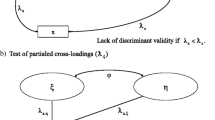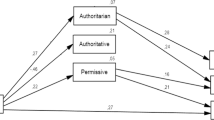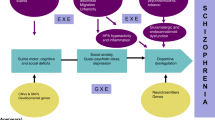Abstract
Behavioral genetic personality research has moved from findings of genetic and environmental effects to new areas. Personality disorders have been included, children and adolescents studied, gender effects evaluated, and the importance of rater sources investigated. Recently, multivariate methods have been applied to disentangle the genetic and environmental latent structure, and investigate covariance in mental disorders. Perhaps the most exciting recent developments are the investigations of situation variables, the studies of how genotypes influence how individuals select themselves into situations and other form of gene-environment correlations, and how genotype moderates the effect of situations and circumstances on behavior (gene-environment interaction). In the future, we will learn how personality, partly determined by heredity, influences our entire lives. We will better understand what we experience, how we interpret the experiences and how to react to them effectively. We will learn how our mental lives develop while we interact with the environment, and we will broaden our understanding of which genes are coding for mental health and mental disorders.
Similar content being viewed by others
References and Recommended Reading
Eaves LJ, Eysenck HJ, Martin NG: Genes, culture and personality: an empirical approach. London: Academic Press; 1989.
Tellegen A, Lykken TD, Bouchard TJ, et al.: Personality similarity in twins reared apart and together. J Pers Soc Psychol 1988, 54:10931–1039.
Pedersen NL, Plomin R, McClearn GE, et al.: Neuroticism, extraversion and related traits in adult twins reared apart and reared together. J Pers Soc Psychol 1988, 54:950–957.
Pedersen NL, McClearn GE, Plomin R, et al.: The Swedish Adoption/Twin Study of Aging: an update. Arch Gen Med 1991, 40:7–20.
Bergman CS, Chipur HM, Plomin R, et al.: Genetic and environmental effects on openness to experience, agreeableness, and conscientiousness: an adoption/twin study. J Pers 1993, 61:159–178.
Eaves LE, Heath A, Martin N, et al.: Comparing the biological and cultural inheritance of personality and social attitudes in the Virginia 30 000 study of twins and their relatives. Twin Res 1999, 2:62–80.
Gillespie NA, Cloninger CR, Heath AC, et al.: The genetic and environmental relationship between Cloninger’s dimensions of temperament and character. Pers Ind Diff 2003, 35:1931–1946.
Neiss MB, Sedikides C, Stevenson J: Self-esteem: A behavioural genetic perspective. Eur J Personality 2002, 16:351–367.
Loehlin JC, Neiderhiser JM, Reiss D: The behavior genetics of personality and the NEAD study. J Res Personality 2003, 37:373–387. An interesting extended twin/family study, showing the consequences of different models, of studying different types of family members and different sources of information.
Jang KL, Livesley WJ, Vernon PA, et al.: Heritability of personality disorder traits: a twin study. Acta Psychiatr Scand 1996, 94:438–444.
Scoursfield J, John B, Martin N, et al.: The development of prosocial behaviour in children and adolescents: a twin study. J Child Psychol Psychiatry 2004, 45:927–935.
Rhee SH, Waldman ID: Genetic and environmental influences on antisocial behavior: A metaanalysis of twin and adoption studies. Psychol Bull 2003, 128:490–529.
Torgersen S, Lygren S, Øien PA, et al.: A twin study of personality disorders. Compr Psychiatry 2000, 41:416–425.
Coolidge FL, Thede LL, Jang KL: Heritability of personality disorders in childhood: A preliminary investigation. J Pers Disord 2001, 15:33–40.
Borkenau P, Rieman R, Angleiter A, et al.: Genetic and environmental influences on observed personality: Evidence from the German Observational Study of Adult Twins. J Pers Soc Psychol 2001, 80:655–668.
Wolf H, Angleitner A, Spinath FM, et al.: Genetic and environmental influences on the EPQ-RS scales: a twin study using self- and peer reports. Pers Individ Diff 2004, 37:579–590.
Bartels M, Boomsma DI, Hudziak JJ, et al.: Disentangling genetic, environmental, and rater effects on Internalizing and Externalizing problem behavior in 10-year-old twins. Twin Res 2004, 7:162–175.
Vernon PA, McCarthy JM, Johnson AM, et al.: Individual differences in multiple dimensions of aggression: a univariate and multivariate genetic analysis. Twin Res 1999, 2:16–21.
Jang KL, Hu S, Livesley WJ, et al.: Covariance structure of neuroticism and agreeableness: A twin and molecular genetic analysis of the role of the seroronic transporter gene. J Pers Soc Psychol 2001, 81:295–304.
Jang Kl, Livesley WJ, Angleiter A, et al.: Genetic and environmental influences on the covariance of facets defining the domains of the five factor model of personality. Pers Indiv Diff 2002, 33:83–101.
Eid M, Rieman R, Angleiter A, et al.: Sociability and positive emotionality: Genetic and environmental contributions to the covariance between different facets of extraversion. J Pers 2003, 71:319–346.
Ando J, Ono Y, Yoshimura K, et al.: The genetic structure of Cloninger’s seven-factor model of temperament and character in a Japanese sample. J Personality 2002, 70:583–609.
Markon KE, Krueger RF, Bouchard Jr TJ, et al.: Normal and abnormal personality traits: Evidence for genetic and environmental relationships in the Minnesota Study of Twins Reared Apart. J Personality 2002, 70:661–693. The powerful design of twins reared apart shows how for instance so-called resilience is determined by the same genes as common personality dimensions.
Slutske WS, Heath AC, Madden PAF, et al.: Personality and the genetic risk for alcohol dependence. J Abnorm Psychol 2002, 111:124–133.
Krueger RF, Hicks BM, Patrick CJ, et al.: Etiological connections among substance dependence, antisocial behavior and personality: Modelling the external spectrum. J Abnorm Psychol 2002, 111:411–424. This is an ingenious study of how latent genetic factors are underpinning personality and disruptive behavior.
Coolidge FL, Thede LL, Jang KL: Are personality disorders psychological manifestations of executive function deficits? Bivariate heritability evidence from a twin study. Behav Genet 2004, 34:75–84.
Agrawal A, Jacobson KC, Prescott CA, et al.: A twin study of personality and illicit drug use and abuse/dependence. Twin Res 2004, 7:72–81.
Kendler KS, Neale MC, Kessler NC, et al.: A twin study of recent life events and difficulties. Arch Gen Psychiatry 1993, 50:589–596.
Stein MB, Jang KL, Taylor S, et al.: Genetic and environmental influences on trauma. Exposure and posttraumatic stress disorder symptoms: A twin study. Am J Psychiatry 2002, 159:1675–1681.
Kendler KS, Gardner CO, Prescott CA: Personality and the experience of environmental adversity. Psychol Med 2003, 33:1193–1202. The article gives a clear description of how personality and environmental adversity works together in determining our mental functioning.
Wade TD, Kendler KS: The genetic epidemiology of parental discipline. Psychol Med 2000, 30:1303–1330.
Spinath FM, O’Connor TG: A behavioral genetic study of the overlap between personality and parenting. J Pers 2003, 71:785–808.
Plomin R, McClearn GE, Pedersen N, et al.: Genetic influence on adults ratings of their current family environment. J Marr Family 1989, 51:791–803.
Lichtenstein P, Ganibarn J, Neiderhiser JM, et al.: Remembered parental bonding in adult twins: Genetic and environmental influences. Behav Genet 2003, 33:397–408.
Gillespie NA, Zhu G, Neale MC, et al.: Direction of causation modelling between cross-sectional measures of parenting and psychological distress in female twins. Behav Genet 2003, 33:383–396.
Krueger RF, Markon KE, Bouchard Jr TJ: The heritability of personality accounts for the heritability of recalled family environments in twins reared apart. J Pers 2003, 71:809–832. This study with the very powerful design with twins reared apart shows how genes influence our recall of family environment through personality.
Ilies R, Judge TA: On the heritability of job satisfaction: The mediating role of personality. J Applied Psychol 2003, 88:750–759.
Johnson W, McGue M, Krueger RF, et al.: Marriage and personality: A genetic analysis. J Pers Soc Psychol 2004, 86:285–294. The study shows in an impressive way how the genetic effect on marriage is mediated by personality.
Johnson AM, Vernon PA, Harris JA, et al.: A behavioural genetic investigation of the relationship between leadership and personality. Twin Res 2004, 7:27–32.
Lenswelt-Mulders G, Hettema J: Analysis of genetic influences on the consistency and variability of the Big Five across different stressful situations. Eur J Pers 2001, 15:355–371. A promising design showing how both the situation we react on and how we react are genetically influenced.
Boomsma DI, de Geus EJC, van Baal GCM, et al.: A religious upbringing reduces the influence of genetic factors on disinhibition: Evidence for interaction between genotype and environment on personality. Twin Res 1999, 2:115–125.
Kendler KS, Gardner CO, Prescott CA: Toward a comprehensive developmental model for major depression in women. Am J Psychiatry 2002, 159:1133–1145. Although personality is not central in this article, it suggests how epidemiology and behavioral genetics in the future may solve numerous etiologic problems.
Kendler KS, Kuhn J, Prescott CA: The interrelationship between neuroticism, sex and stressful life events in the prediction of episodes of major depression. Am J Psychiatry 2004, 161:631–636. This is an interesting demonstration of gene-environment interaction.
Author information
Authors and Affiliations
Rights and permissions
About this article
Cite this article
Torgersen, S. Behavioral genetics of personality. Curr Psychiatry Rep 7, 51–56 (2005). https://doi.org/10.1007/s11920-005-0025-4
Issue Date:
DOI: https://doi.org/10.1007/s11920-005-0025-4




